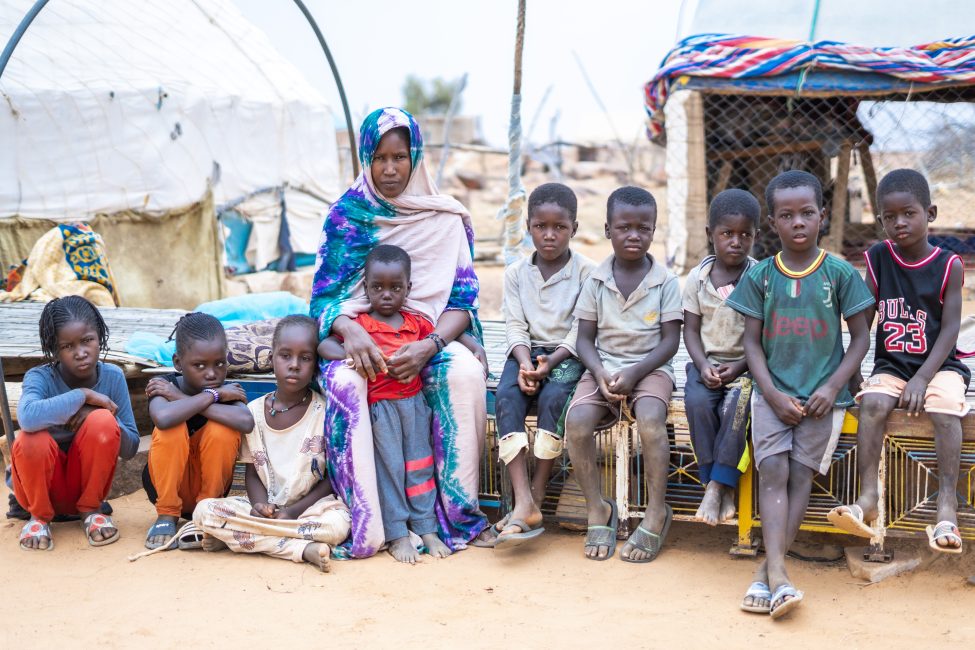All around the world, we have noted a worrying increase in major floods, persistent droughts and heatwaves caused by climate change. The Sahel is no exception. It is an area of African savannah between the Sahara Desert and the tropical region in the south that stretches thousands of kilometres from the Atlantic Ocean to the Red Sea in the east. Extreme climate conditions here are afflicting the poverty-stricken population with increasing frequency.
Climate change is hitting Mauritania hardest
Of all the countries in the Sahel, Mauritania has been hit hardest in recent years. 90% of it is in the Sahara Desert, and it is particularly vulnerable to climate disasters. 2012 is still fresh in a lot of Mauritanians’ minds as the year when many of them lost everything. The population is still traumatised by what they experienced then. Fears of another catastrophe came to pass when another terrible drought struck the country from the beginning of 2021 until the summer of 2022, the worst in a decade.
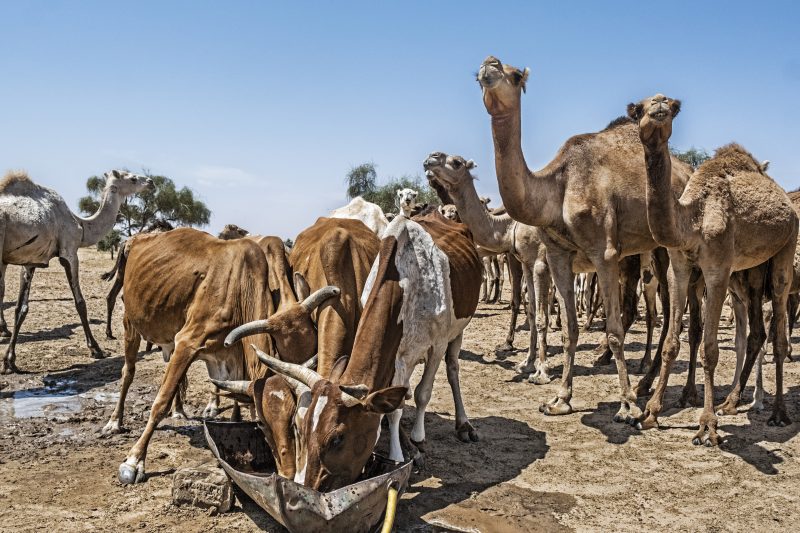
Many animals succumbed during the hottest months at the end of the dry season. ©️Tim Dirven
Due to the persistent drought, up to 80% less fodder grew on the grasslands. This led to a rapid deterioration in the physical condition of livestock. Suffering from weight loss and reduced immunity, many animals succumbed in the period between April and June 2022, the hottest months at the end of the dry season.
This was a grim reality for Moustapha Ould Mami as well: “Until recently I was a livestock keeper, but I lost all my herds in the drought,” the distressed farmer tells us. “We had no choice but to cut down trees to sell as charcoal. But even the money we got from that was hardly enough to buy food. We couldn’t even send the children to school because we were so hungry.”
Falling livestock prices and rising food prices – caused by the war in Ukraine – have pushed many livestock farmers to the brink of extreme poverty. They are now trying, often without success, to keep their remaining herds alive until the next rainy season, strengthening the animals in the hope that they will at least yield better prices. Armed conflict in neighbouring countries is exacerbating the already precarious living conditions of Mauritanian herders. In excessively dry periods like the one they are experiencing now, they usually cross the border into Mali, but the conflict there has made these traditional grazing routes inaccessible.
Holding on by the skin of their teeth
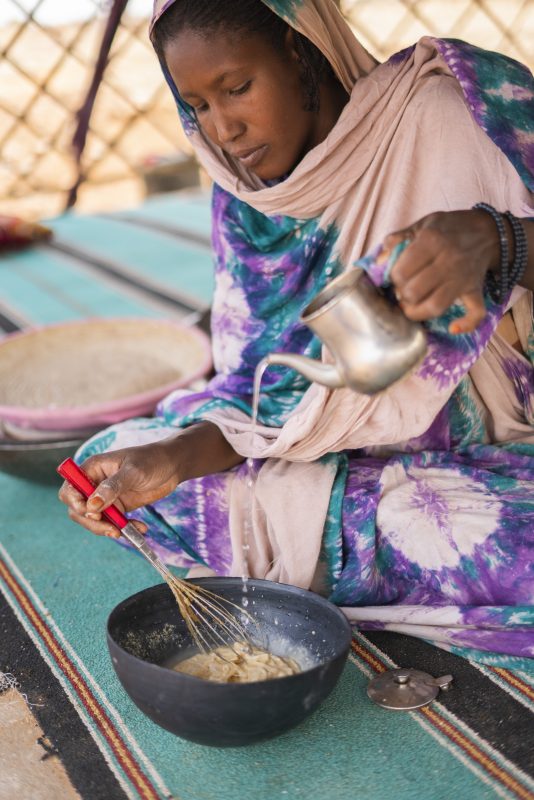
Vatimetou prepares porridge with enriched flour for her young babies. ©️Malika Diagana
The prolonged drought, rising food prices and the violence of the war in Mali resulted in high levels of malnutrition. More than 20% of the population faced acute food insecurity and entire communities became dependent on food aid to survive. Households without livestock were hit hardest.
“In a good rainy season, we grow beans and watermelon, but in the last two years this has been impossible. We suffered from real hunger. The children had to forage for gum arabic in the acacia trees to quell their hunger pangs,” says Vatimetou Mint Devaye.
Owning livestock is a way for people to insure themselves against climate shocks. In times of drought or other catastrophes, livestock can be sold for food and other basic necessities. Livestock keeping – and more specifically pastoralism or nomadic livestock keeping – enables them to adapt to the unpredictable climate and provide for themselves even in the face of adversity.
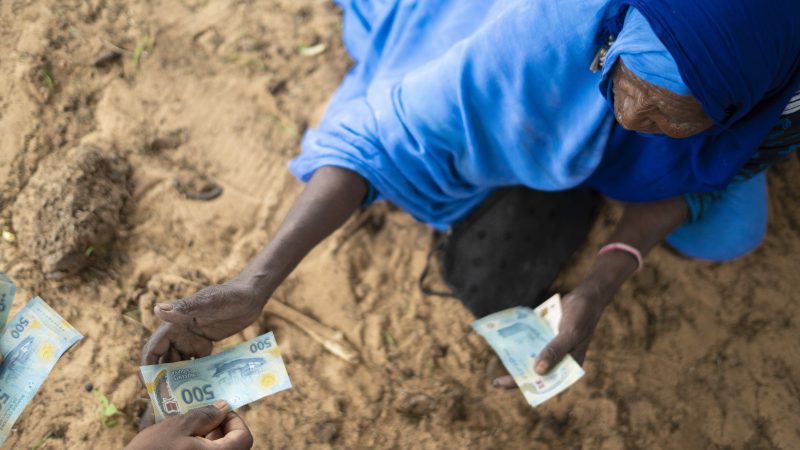
Each family also received an average of €70 in cash per month. ©️Malika Diagana
“Have you seen my sheep? I bought it with the cash I received. Now I am a livestock keeper again,” Sidaty Ould Khattar tells us proudly. “Every goat I can sell brings in money to buy food for the children, and I have even been able to save some of it. So you see, our situation is really improving!”
To meet the needs of the families hit by the drought, Vétérinaires Sans Frontières Belgium has organised distributions of food and money from July till October 2022. We distributed fresh meat – after thorough inspection – to 4,176 vulnerable people. As well as 9 kg of meat, each family also received an average of 70 euros in cash per month. That allowed them to meet their food needs during the last three difficult months before the next harvest season began. Families with pregnant or breastfeeding women also received an additional 18 kg of enriched flour.
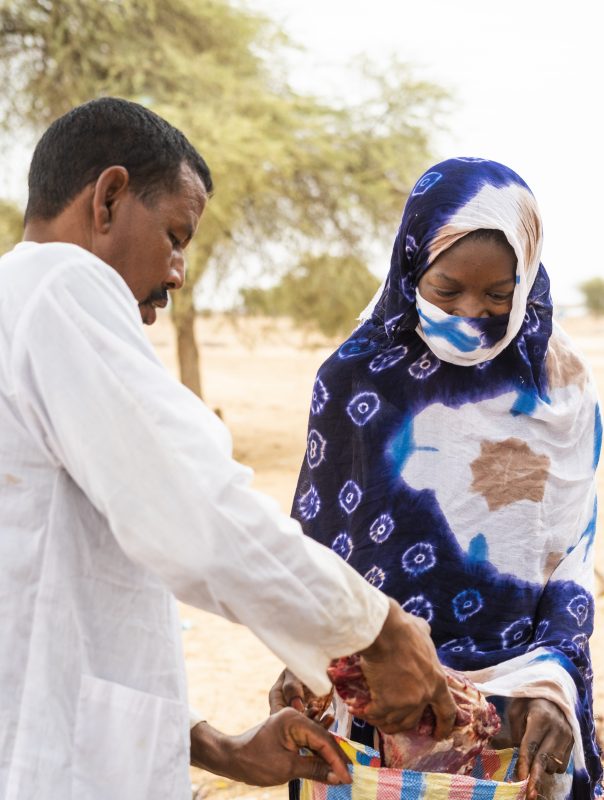
After thorough inspection, each family received 9 kg of fresh meat per month. ©️Malika Diagana
“This aid has made us feel like worthy human beings,” Vatimetou Mint Devaye tells us. “Before it came, we felt dirty and despairing. We didn’t even have enough money to buy soap.” She carefully hung up the meat she received on ropes to dry so that it would keep for longer.
Greater resilience to climate shocks
Hardly a drop of rain had fallen in the past two years. However, the long-awaited rainy season that lasts from July to September was nothing short of a deluge this time. The rainfall was 600% higher than average and caused devastating floods.
Climate uncertainty, when persistent drought alternates with catastrophic flooding, also contributes to the spread of many animal diseases and massive soil erosion. To help the local population develop greater resilience to future climate shocks, we are strengthening their long-term capacities with the help of our donors. We are focusing on the activities of the local animal health network, offering livestock keepers training in the appropriate action required to face an impeding climate disaster (according to the Livestock Emergency Guidelines and Standards) and investing in infrastructure to prevent further erosion and restore the soil.
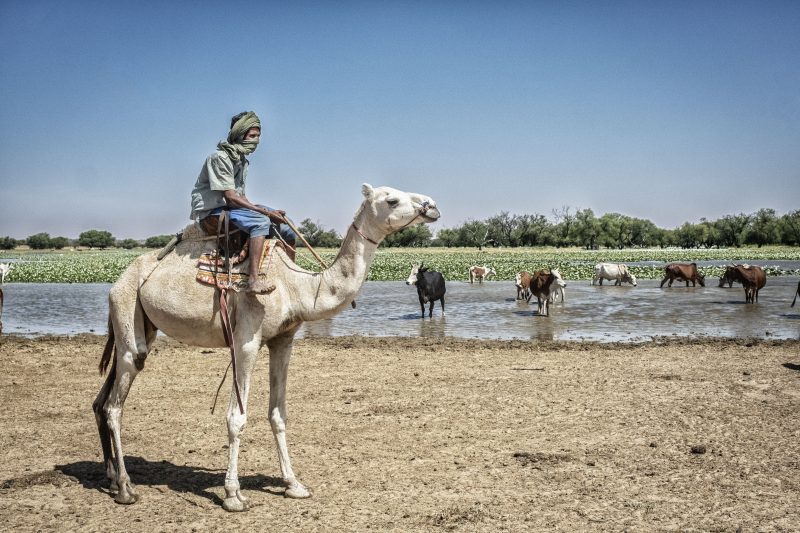
Owning livestock is a way for people to insure themselves against climate shocks. ©️Tim Dirven
Time and again, the poorer areas where the most vulnerable people live are the ones most severely hit by extreme weather conditions. In Mauritania, there is no time left to wait for international politics to show courage. That is why we are supporting the local population today so that they can successfully adapt to the climate change that they have not caused but are already experiencing first-hand.
Following the successful impact of our interventions in the early 2000s to establish a productive dairy sector, VSF-B has been back in Mauritania since summer 2020 with an integrated strategy for health. We are committed to the three pillars of One Health through interventions for soil conservation and rehabilitation, improving animal health care, and emergency actions to ensure food and nutrition security of households vulnerable to climate shocks. We are implementing our actions under this last pillar with the support of the European Union – European Civil Protection and Humanitarian Aid Operations, as illustrated in this article.


